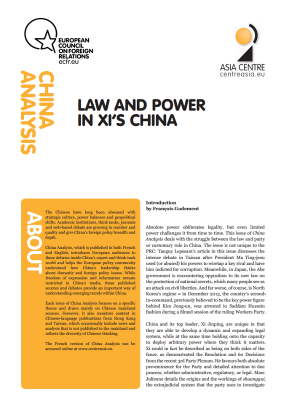China Analysis: China’s neighbourhood policy
Relations between China and its neighbours changed dramatically
All geopolitical developments in Asia are closely linked to China's new neighbourhood policy. Over the past decade, relations between China and its neighbours have undergone dramatic changes. China's emphasis on developing a favourable regional environment has been replaced by a new kind of foreign policy: Projecting assertiveness on maritime issues and pursuing a muscular trade policy. But how do neighbours react to this new neighbourhood policy? Is China becoming the nucleus of regional economic integration or the key player in a series of different regional conflicts?
The latest issue of China Analysis, published by ECFR and Asia Centre, analyses China's neighbourhood policy:
- Does China have hegemonic aspirations? The Chinese foreign policy community is divided between those who seem infatuated with the notion of developing China into a “big power” and those who prefer a low-profile and gradualist approach echoing Deng Xiaoping's concept of “peaceful rise” and “low profile” nation.
- A new conflict between China and India? Trust between China and India remains low. At the same time cooperation between India and the US has increased tensions over navigation routes in the Indian Ocean. Chinese foreign policy analysts perceive this as a “security challenge” and think that China should “take precautions”.
- Is Mongolia China’s perfect neighbour? There are no conflicts between both countries and the economies complement each other: Mongolia has the raw materials that China needs, but to exploit them effectively, it needs Chinese technology and capital investment. However, China is worried about Mongolia's “third neighbour” strategy.
- What are China's interests in Central Asia? China seems to be committed to get involved in Central Asia – both bilaterally and within the Shanghai Cooperation Organisation. But Central Asian states want to maintain the existing regional geopolitical balances and have no desire to be strategically dependent on an individual country.
The European Council on Foreign Relations does not take collective positions. ECFR publications only represent the views of their individual authors.



